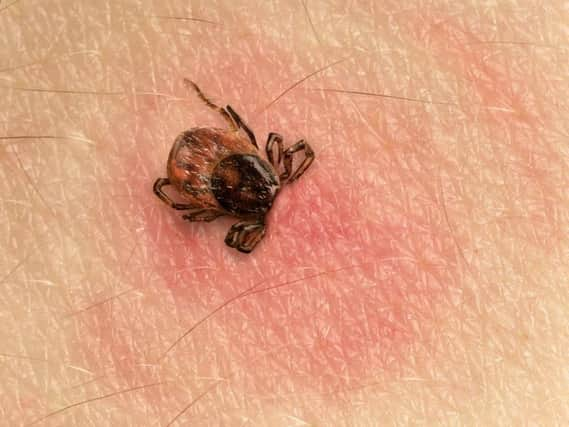Doctors attacked for belittling tick-borne illness


David Francey has endured four years of hell which he says has left him feeling like he’s been poisoned since first collapsing on a trip to China where he taught local children English.
Francey was eventually diagnosed with Lyme Disease, active Babesia microti and several other tick-borne diseases, having paid to be privately tested through Armin Labs in Germany who specialise in diagnosing rare types of infection.
Advertisement
Hide AdAdvertisement
Hide AdThis followed numerous visits to his GP, hospitals and him testing negative for Lyme Disease after taking the standard NHS test.
The former teacher, who is in his late 30s and lives in Glasgow, has not been able to work in the last four years and has suffered from an array of debilitating symptoms including chronic migraine, joint pain, visual disturbances and fibromyalgia.
He told Scotland on Sunday that people with his illnesses are “trapped in limbo, we are the undead”, and said that an alarming number are having their private test results rejected by Scottish doctors.
Francey added: “My issue here is that I’ve tested positive – fair enough, not through NHS tests, but test results coming from accredited laboratories that should be merit further testing in my opinion, especially when a patient is suffering severely and symptomatic.
“There is an alarming number of patients experiencing a similar situation – private test results rejected without NHS tests being offered. Some patients are so desperate that they’re self-treating with antibiotics.”
Last month it was reported a malaria-like infection called Babesia venatorum which can be passed to humans has been found in Scotland for the first time.
The University of Glasgow’s School of Veterinary Medicine published a paper saying the parasite had been recorded extensively in the Far East including China.
Several co-infections, including Babesia, have been documented in Scotland while European, French and Turkish studies found many other pathogens in ticks.
Advertisement
Hide AdAdvertisement
Hide AdFrancey said: “Lyme Disease is known as ‘the great imitator’ due to the diverse nature of symptomatology. “Testing is needed – vets know more about these infections than doctors.
“The infections exist but doctors are not looking for them.
“Infectious disease doctors belittle these private tests whilst offering no tests of their own. Important research is being overlooked. The field is labyrinthine. Research is needed, urgently.”
Misdiagnosis of Lyme Disease is common because its symptoms are so varied – even from patient to patient – -and can be similar to other illnesses such as fibromyalgia, chronic fatigue syndrome, multiple sclerosis and also things like depression and flu.
Professor John Lambert, of the Lyme Resource Centre and UCD School of Medicine in Dublin, said that “various species” of Babesia have been found in abundance in deer and sheep in Scotland.
He added: “Patients in Scotland are having great difficulty getting tested for tick-borne infections other than Lyme Disease. Tests from private laboratories are often not accepted. Because of chronic underfunding, the Scottish Lyme Disease and Tick-borne Infections Reference Laboratory has no accredited tests for tick-borne infections other than Lyme Disease.